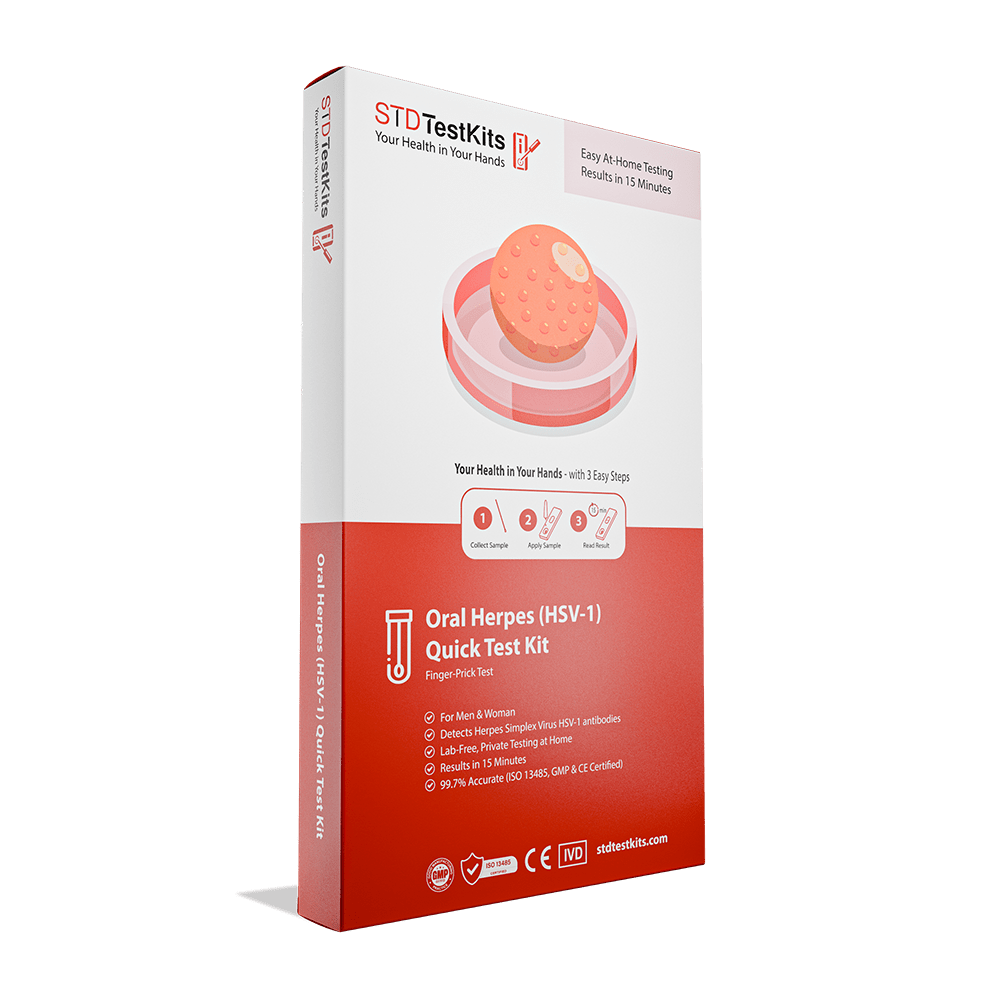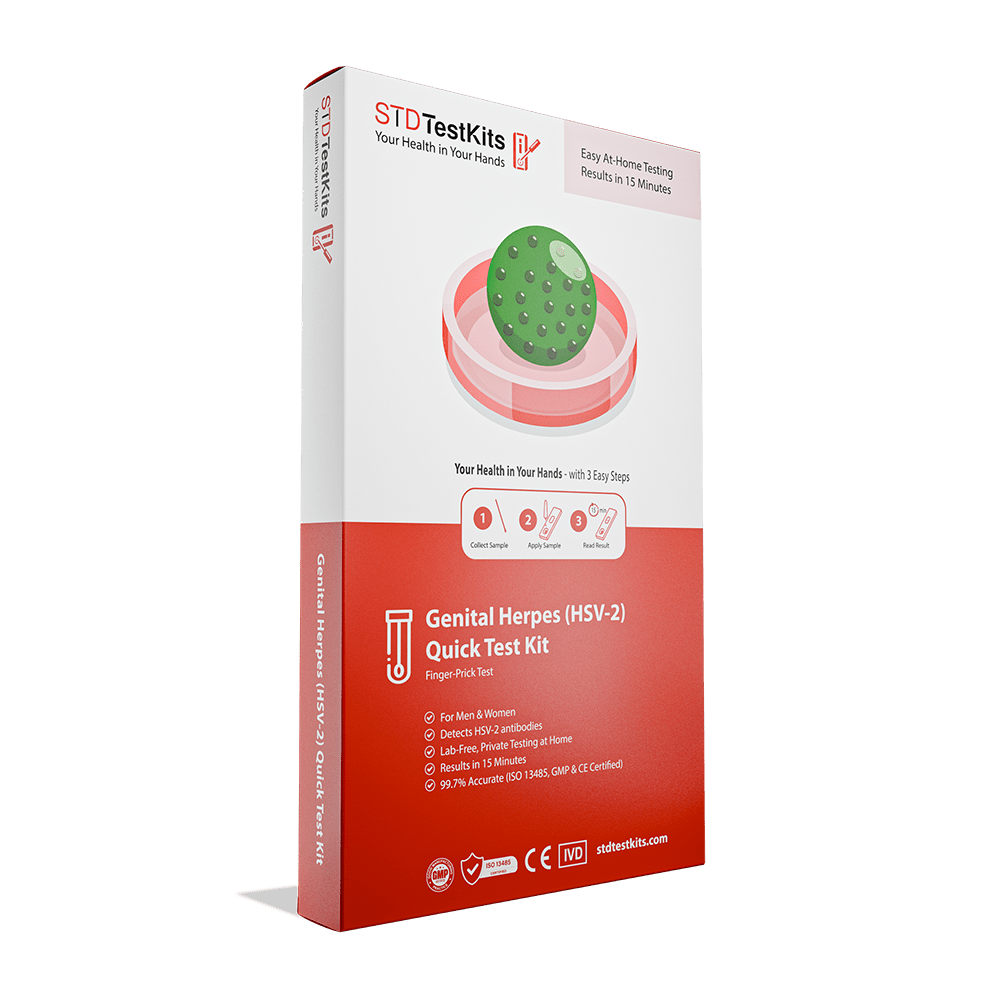You Have Herpes. Now You Have to Tell Them. Here’s How.
Quick Answer: Herpes outbreaks can be triggered by stress, hormonal changes, friction, illness, or nothing at all. Suppressive therapy and lifestyle changes can significantly reduce outbreak frequency and transmission risk, even if you're asymptomatic.
This Isn’t Just a Bump, And Here’s Why That Matters
Herpes often hides in plain sight. Some people notice tingling, itching, or a cluster of tiny fluid-filled blisters near the genitals, anus, or mouth. Others mistake early signs for razor burn, friction, or allergic reactions. According to the CDC, up to 90% of people with HSV-2 (the primary cause of genital herpes) don’t even know they have it. That’s not a typo, most people are living with herpes without a clue, often because symptoms are so mild or misread.
But when you do experience an outbreak, the signs can be unmistakable. Burning. Swelling. Maybe even flu-like symptoms like body aches or swollen glands. And then the emotional fallout kicks in. You Google obsessively. You cancel plans. You try to remember who you were with last. You wonder what you did wrong. And here's the myth-busting truth: nothing. You did nothing wrong.
Herpes doesn’t follow moral rules. It’s a virus, not a verdict. It can pass even when there are no visible symptoms, and it can reactivate because of stress, not sex. So if you’re beating yourself up over what’s happening to your body, take a breath. You’re not dirty. You’re not broken. You’re managing a condition that’s more common than asthma, and you're not alone.

People are also reading: Scared to Have Sex Again After an STD? Here’s the Real Talk You Need
Triggers Aren’t Always What You Think
Let’s talk about why outbreaks happen, and why it’s not your fault. Herpes lives in your nerve cells, and once you've been infected, the virus stays dormant there, sometimes for months, even years. Then, something causes it to reactivate. But it’s not always obvious what that “something” is. While common triggers include illness, stress, friction during sex, or hormonal changes, research shows that reactivation can also be completely spontaneous.
According to a 2013 study published in the Journal of Virology, herpes viral shedding (which means the virus is active and transmissible) can occur in people who show no symptoms at all. This explains why someone might pass the virus even when they haven’t had an outbreak in months. It also explains the frustration of managing outbreaks that seem to appear “out of nowhere.”
Stress, in particular, plays a significant role. When your body is under physical or emotional pressure, your immune system diverts resources, and that’s when dormant viruses can take the stage again. The International Journal of Molecular Sciences found that cortisol (a stress hormone) may actually enhance herpes simplex virus replication in nerve cells. Translation: your breakup, your finals week, or your panic spiral after missing a workout? Yeah, those could absolutely set things off.
Suppressive Therapy: What It Is and Who It Helps
Suppressive therapy remains one of the effective approaches to bring down both the recurrence rate of infections as well as the risk of transmitting the infections to their partners. The approach requires the administration of anti-viral medication like valacyclovir (Valtrex) or acyclovir daily. To many patients with genital herpes infections, it is not uncommon to develop a regular regimen similar to those taken for vitamin supplements or contraception.
The Herpes Management Study found that daily suppressive therapy reduced symptomatic outbreaks by 70–80% in people with frequent recurrences. Even more importantly, it reduced viral shedding, and therefore the chance of transmission, even in those who had no visible sores. That’s huge. That means you can have sex, date, and live a connected life without passing the virus, especially if combined with condom use and transparent communication.
Some folks only take antivirals when they feel an outbreak coming on, this is called “episodic therapy.” It works best for people who have predictable triggers and very infrequent outbreaks. But if you're dealing with flare-ups monthly, or even quarterly, daily medication might give you your peace of mind back. And that’s not a small thing.
What No One Tells You About Herpes and Sex
The hardest part of living with herpes usually isn’t the outbreak itself. It’s what happens before and after, the anxiety, the shame, the fear of being seen as “risky.” And that weight gets heavier when you’re trying to date, to hook up, to have sex without bringing a spreadsheet of disclosures to bed.
Here’s what the public rarely acknowledges: sex with herpes can be safe, satisfying, and deeply intimate. You just need the right tools, and the right frame of mind. Let’s start with the facts. Suppressive therapy plus condoms brings the risk of transmission down dramatically. A 2004 clinical trial in The New England Journal of Medicine found that daily valacyclovir reduced the risk of transmitting genital herpes to a sexual partner by 48%, and when combined with condoms and avoidance during outbreaks, that risk dropped even further.
That’s not “playing with fire.” That’s managing a virus with the same intentionality people use when preventing pregnancy or practicing other forms of safer sex. But stigma skews perception. One study published in Sexually Transmitted Infections found that many people fear herpes more than HIV, not because of facts, but because of shame. That disconnect is powerful, and dangerous.
But there’s another truth here: some of the best sex people have had comes after their diagnosis. Why? Because it forces you to slow down. To communicate. To get real. It filters out partners who can’t handle honesty, and it makes room for the ones who can. That kind of sex, the vulnerable, unhurried, emotionally safe kind, tends to be a lot more satisfying than anything that starts with “Wanna come over?” at 2am with no context.
Myth vs Reality: What People Still Get Wrong
Even in 2025, myths about herpes are everywhere. You can’t scroll TikTok or Reddit without seeing someone asking if they can get herpes from a towel, or whether it means the end of their dating life. So let’s bust a few of the most stubborn misconceptions, with data, not fear.
Table 2: Herpes myths vs medically supported facts
If you’re reeling from a diagnosis or worrying about what to say to someone you like, remember this: herpes isn’t rare. An estimated 1 in 6 adults in the U.S. has HSV-2, and over half the population carries HSV-1. Most people already have it or know someone who does, and the ones who react poorly are usually reacting to stigma, not science.
“I Thought I Was Cursed, Now I’m Just Informed”
Adrian, 27, remembers how isolated he felt after being diagnosed with genital herpes in college.
“I thought I was damaged goods. I couldn’t eat. I avoided touching anyone. I honestly thought no one would ever want to date me again.”
For months, he spiraled, reading forums, deleting dating apps, canceling hangouts with friends just to avoid the shame.
Then something shifted. “I finally found a sex therapist who worked with queer clients. She broke it down: herpes is a skin condition, not a moral failing. It has zero impact on who I am or how lovable I am. And when I started suppressive therapy, everything got easier. Fewer outbreaks. More confidence. Better sex.”
Adrian’s story isn’t rare. The intersection of stigma and mental health around herpes is a hidden epidemic. One study in BMJ Open linked herpes diagnosis with elevated levels of depression and social withdrawal, especially when people weren’t properly counseled or informed. The good news? That trend reverses when people are empowered with accurate information, access to treatment, and community support.
Herpes and the Mind-Body Connection
It’s impossible to talk about managing herpes without talking about mental health. Because stress isn’t just a trigger, it’s a cycle. You get stressed, you have an outbreak, you feel shame, and that fuels more stress. It’s easy to fall into the trap of hypervigilance: scanning your body for signs, avoiding touch, skipping dates because you’re terrified of rejection.
Breaking that cycle starts with reframing your relationship to the virus. You’re not battling your body, you’re learning to care for it. And part of that care might include medication, therapy, journaling, sex breaks, or supplements. There’s no one-size-fits-all plan, but there is a path forward that doesn’t involve fear as your compass.
Many people find that mindfulness-based stress reduction (MBSR), CBT, and even group therapy help reduce outbreak frequency, not because these cure herpes, but because they support the immune system by lowering baseline stress. In fact, the Journal of Psychosomatic Research reports that patients with recurrent HSV outbreaks who practiced daily stress management techniques had fewer episodes over a 6-month period than those who didn’t.
If you need permission to start therapy or ask for meds, this is it. If you need someone to say you’re still desirable, still worthy, and still a whole human being, here it is. Herpes doesn’t define your sex life. But how you respond to it might redefine your self-worth in ways you never expected.

People are also reading: How to Tell a New Partner You’ve Had an STD
How to Talk to a Partner Without Melting Down
If the idea of telling someone you have herpes makes you want to crawl out of your skin, you’re not alone. Disclosure is one of the biggest emotional hurdles for people living with HSV, and the fear often has less to do with the virus itself, and more to do with rejection, shame, and trauma from previous reactions.
But here’s the thing: every time you disclose, you’re doing something brave. You’re modeling consent, communication, and care. That’s not gross, that’s powerful. And if someone flakes out on you after hearing your truth, you’ve just dodged someone who can’t handle real intimacy. That’s a gift, not a loss.
Sasha, 34, shares what changed for her: “At first, I would panic and word-vomit everything on the first date. But I realized I don’t owe everyone my medical file. Now, I bring it up when we’re both starting to get vulnerable, usually before things get physical. I say, ‘Hey, I want to be upfront about something because I care about safety and honesty.’ It’s awkward, but it’s real. And I’ve had amazing partners because of that honesty.”
If you’re unsure how to frame the conversation, you’re allowed to practice. You’re allowed to write it down, rehearse with a friend, or even use pre-written disclosure templates if that helps. But most of all, you’re allowed to wait until it feels safe. Disclosure isn’t a performance. It’s a boundary. And boundaries are sexy.
Prevention Without Paranoia
Herpes doesn’t have to rule your sex life, but understanding how to reduce risk makes everything easier. Think of prevention like a toolkit, not a sentence. And no, it’s not just about condoms (though they help).
Daily suppressive therapy significantly lowers the chances of viral shedding, even when you feel fine. Condoms or dental dams add another layer. And communicating with your partner, especially about whether either of you has active symptoms, is crucial. But there’s also timing: avoiding sex during outbreaks or when you’re feeling run down can reduce flare-ups and help your body recover faster.
One such overlooked resource? Getting tested together. It takes the sting out of the experience and provides the opportunity to have open communication. At Home STD Testing provides discretion and convenience. It is a comfort to take it at home if you have been intimate with your sex partner to eliminate the fear associated with going to the doc.
Testing is not just about knowing your status; it's also about reclaiming your power. Because when you know what's going on in your body, you stop living in fear and start living in truth.
The Food Fight: Can Diet Trigger Outbreaks?
If you’ve spent any time on herpes forums, you’ve probably heard someone say chocolate, coffee, or nuts gave them an outbreak. Or that lysine supplements are a miracle cure. But what does the science actually say?
First, some context: the lysine-arginine theory is based on how the herpes virus uses certain amino acids to replicate. Arginine, found in foods like nuts, seeds, and chocolate, is thought to support viral replication, while lysine may suppress it. Some small studies and anecdotal evidence suggest that taking lysine may help reduce outbreak frequency, but the evidence is far from conclusive.
A 1984 double-blind study found that lysine supplementation slightly reduced recurrence in people with frequent HSV-1 outbreaks, but it wasn’t a silver bullet. Other studies have shown little to no effect, especially for genital herpes. And no clinical body currently recommends lysine as a first-line treatment. So while it might help you personally, it’s not a universal fix.
As for the “trigger foods”? The truth is, food affects people differently. Some folks swear spicy meals or red wine cause outbreaks. Others have zero issues. The key is noticing your body’s patterns and keeping a low-stress relationship with food. Obsessing over every bite can actually increase stress, which, ironically, is a much more proven trigger.
Table 3: Food and supplement myths vs actual research on herpes triggers
If you’re curious, try journaling symptoms after meals, not to restrict, but to learn. Your triggers are yours. No Reddit thread can define them for you.
Testing, Retesting, and Knowing When It’s Time
Maybe you’ve had herpes for a while and you’re wondering: should I ever retest? The answer depends on what you're managing. If you were diagnosed based on symptoms alone, and never had a confirmatory test, it might be helpful, especially if you’re starting a new treatment plan or entering a long-term relationship. At-home herpes test kits can offer fast reassurance, but confirmatory blood tests or PCR swabs from clinics are more definitive for many people.
If you're starting suppressive therapy, some providers recommend re-testing for other STDs as a baseline, especially if you’re navigating multiple exposures. Retesting isn’t about doubt, it’s about data. And for some people, seeing that “positive” line again helps normalize the diagnosis and make peace with it. You stop chasing a “cure” and start focusing on care.
If you’re unsure where to start, try this: ask yourself if you’re avoiding testing because you’re scared, or because you don’t need it. If it’s fear, that’s your sign to act. Courage starts with one answer at a time.
FAQs
1. Can I really pass herpes even when I don’t have symptoms?
Yes, and that’s one of the most frustrating things about it. Herpes can shed from your skin even when there’s nothing visible. That’s called asymptomatic shedding, and it’s why people say “I had no idea I had it” after passing it to someone. It doesn’t mean you did anything wrong. Just biology doing its sneaky thing.
2. Does daily suppressive therapy actually work?
It’s not snake oil, it works. Taking antivirals every day (like valacyclovir) can lower the number of outbreaks you get *and* reduce the chance of passing the virus to someone else. If herpes is a fire alarm, suppressive meds are like soundproof walls and a sprinkler system. Less chaos, more control.
3. Is it safe to have sex during an outbreak?
Technically possible? Yes. Smart? Not really. Outbreaks are when the virus is most active, and you’re more likely to shed and transmit. Plus, it’s probably not the most comfortable time for you. Wait it out, rest up, and come back swinging when things calm down.
4. Are condoms enough to protect my partner?
They help a lot, but they’re not invincible. Herpes can live on skin outside the condom area (like your thighs or pubic mound), so there’s still a chance of transmission. But combine condoms with suppressive therapy and good communication? That’s the dream team.
5. Do I need to tell my partner if I have herpes?
Short answer: yes. Longer answer: honesty gives people the dignity to make informed choices, and that’s what real intimacy is built on. Most people appreciate the heads-up, and the ones who don’t? Not your person. Disclosure isn’t rejection insurance, it’s self-respect in action.
6. Can I still have kids?
Absolutely. Plenty of people with herpes have healthy pregnancies and deliver safely. Just let your provider know early, because they’ll monitor you during the third trimester. If you have an outbreak near your due date, you may be offered a C-section to prevent passing the virus during delivery. But herpes and parenthood? 100% compatible.
7. Will herpes ruin my sex life?
Only if you let shame run the show. And you don’t have to. In fact, a lot of people say their sex lives got better post-diagnosis, more communication, more intentional touch, more emotional intimacy. Herpes can make you better at sex, not worse. Wild, right?
8. Should I avoid certain foods?
Maybe. But don’t spiral. Some folks notice flare-ups after chocolate, coffee, or nuts, others are totally fine. There’s no one-size-fits-all list. If you’re curious, track how your body reacts and adjust if needed. Just don’t let Reddit fear-mongering rob you of your favorite snacks without receipts.
9. Can I get tested at home?
Yes, and thank the gods for that. At-home herpes test kits exist, and they’re a game-changer if you hate waiting rooms, judgmental glances, or awkward clinic convos. STD Test Kits offers discreet, fast testing you can do from your bedroom. No eye contact required.
10. Will I ever feel “normal” again?
Maybe not the same normal, but a better one? Absolutely. The first few weeks or months after diagnosis can be brutal. But eventually, the virus becomes background noise. You learn your triggers. You get better at protecting yourself and your partners. And you realize that everyone’s carrying something, this just happens to be yours.
You’re Not the Virus, You’re the One Living Through It
Let’s be real. Living with herpes can feel like a before-and-after moment. Before: carefree, maybe naïve, maybe just lucky. After: aware, cautious, sometimes afraid. But here’s what most people don’t tell you, “after” can be better. It can be more honest, more connected, more deliberate. Sex gets realer. Friendships deepen. You show up for yourself in ways you never had to before.
Whether you’ve had one outbreak or twenty, whether you’re taking suppressive meds or just now Googling symptoms for the first time, there’s no shame in being here. You’re allowed to be informed. You’re allowed to be upset. And you’re allowed to move forward on your own terms.
If you’re tired of guessing or carrying fear alone, start with one step. This discreet at-home combo test kit can help you screen for multiple STDs, including herpes, from the privacy of your home. Your answers are yours, and that’s a power you deserve.
How We Sourced This Article: We combined current guidance from leading medical organizations with peer-reviewed research and lived-experience reporting to make this guide practical, compassionate, and accurate. In total, around fifteen references informed the writing; below, we’ve highlighted some of the most relevant and reader-friendly sources.
Sources
1. Herpes & Relationships – American Sexual Health Association (ASHA)
2. Living With Herpes – Planned Parenthood
3. Genital Herpes: How to Have a Healthy Sex Life With Herpes – EHG
4. Living With Herpes – Verywell Health
5. Genital Herpes: Causes, Symptoms & Prevention – Cleveland Clinic
About the Author
Dr. F. David, MD is a board-certified infectious disease specialist focused on STI prevention, diagnosis, and treatment. He blends clinical precision with a no-nonsense, sex-positive approach and is committed to expanding access for readers in both urban and off-grid settings.
Reviewed by: Dr. L. Moretti, MPH | Last medically reviewed: November 2025
This article is for informational purposes and does not replace medical advice.







